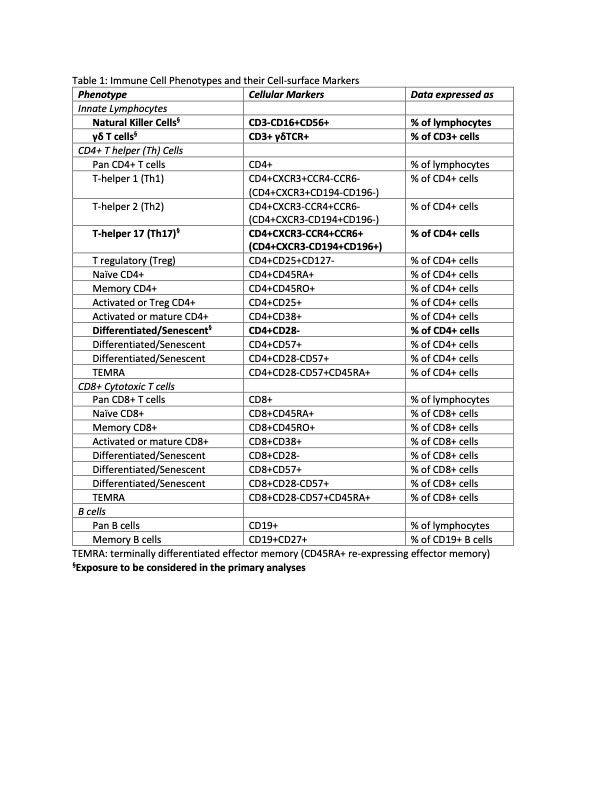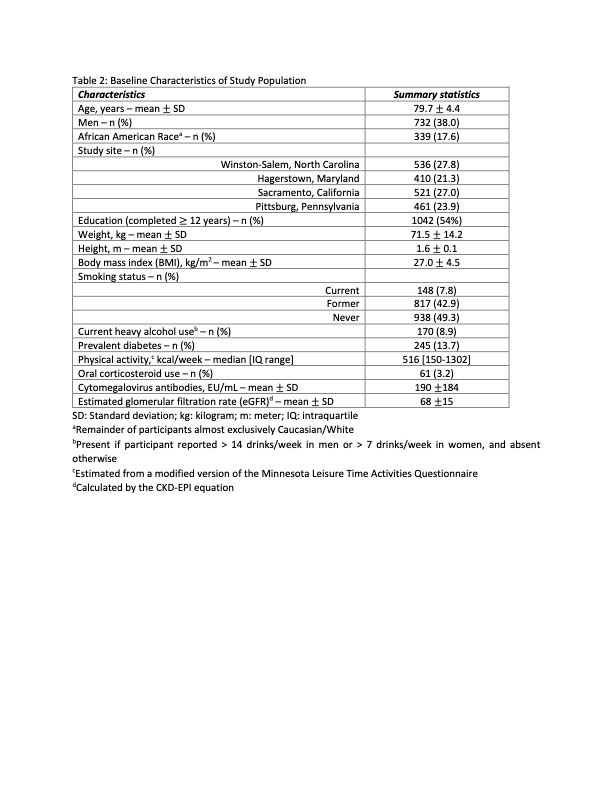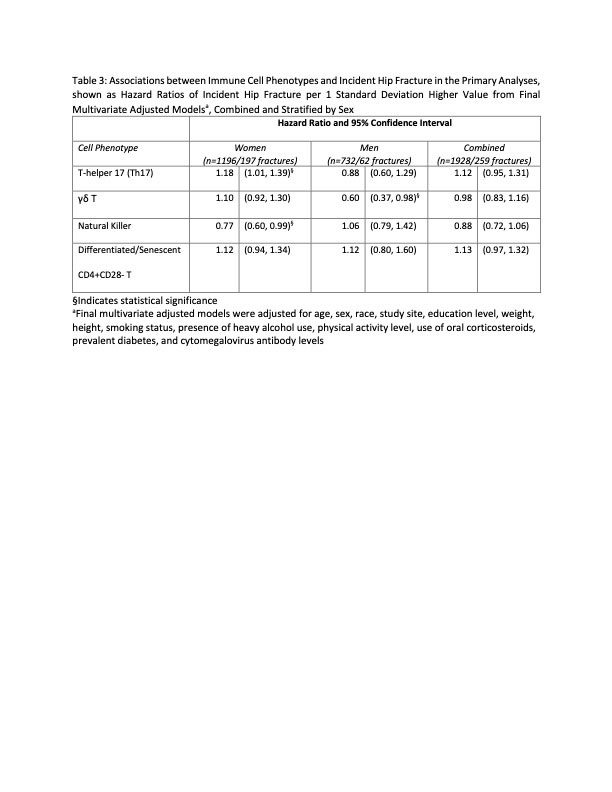Session Information
Date: Sunday, November 13, 2022
Title: Osteoporosis and Metabolic Bone Disease – Basic and Clinical Science Poster
Session Type: Poster Session C
Session Time: 1:00PM-3:00PM
Background/Purpose: Cell-mediated immunity may play a role in osteoporosis development. Fracture is the major consequence of osteoporosis. Thus, cell-mediated immunity may impact fracture risk. We evaluated whether innate and adaptive immune cell subsets in peripheral blood are risk factors for hip fracture.
Methods: The Cardiovascular Health Study (CHS) is a large U.S. cohort of community-dwelling, older (age ≥ 65 years) men and women. We included all CHS participants with at least one innate or adaptive immune cell phenotype measured by flow cytometry from cryopreserved cells collected in 1998-1999. Incident hip fractures were identified by participant report every six months following exposure measurement and confirmed by hospital medical record review. Participants were followed until first hip fracture event, death, loss to follow-up, or June 30, 2015, whichever occurred first. Cox hazard models with adjustment for fracture risk factors were used to evaluate associations of immune cell phenotypes with incident hip fracture in sex-stratified and combined analyses. T-helper 17 (Th17), γδ T, natural killer (NK) and differentiated/senescent CD4+CD28- T cell subsets were specified as subsets of interest for the primary analyses. In secondary analyses, 21 additional cell phenotypes were investigated (Table 1). A significance level of α=0.05 was used in primary and secondary analyses, with correction for multiple testing using the false discovery rate approach for the 21 immune subsets in the secondary analyses.
Results: A total of 259 incident hip fractures (n=197 in women; n=62 in men) occurred among 1928 persons over a median 9.7 years of follow-up. Baseline characteristics of the study population are described (Table 2). There were no statistically significant associations of the Th17, γδ T, NK or differentiated/senescent CD4+CD28- T cell subsets or other immune cell phenotypes with incident hip fracture in analyses combining men and women after multivariate adjustment. In women, a higher proportion of Th17 cells was associated with higher hip fracture risk (hazard ratio (HR) [95% confidence interval (CI)] of 1.18 [1.01, 1.39] per 1 standard deviation higher value) and a higher proportion of NK cells was associated with lower hip fracture risk (HR [95% CI] of 0.77 [0.60, 0.99]). In men, a higher proportion of γδ T cells was associated with lower hip fracture risk (HR [95% CI] of 0.60 [0.37, 0.98]) (Table 3). There was a significant difference between hazard ratios of incident hip fracture for men and women for NK (p=0.02) and γδ T (p=0.01) cell subsets in formal interaction testing.
Conclusion: Our study revealed important associations of immune cell phenotypes in peripheral blood and incident hip fracture that may differ by sex. Further mechanistic studies should explore whether these potential sex differences in these associations are mediated through osteoporosis development, bone quality and strength, bone turnover, sex steroid hormones or other pathways.
To cite this abstract in AMA style:
Elam R, Buzkova P, Delaney J, Fink H, Barzilay J, Carbone L, Saha R, Robbins J, Mukamal K, Valderrabano R, Psaty B, Tracy R, Olson N, Huber S, Doyle M, Landay A, Cauley J. Immune Cell Subsets and Risk of Incident Hip Fracture in Older Adults: The Cardiovascular Health Study [abstract]. Arthritis Rheumatol. 2022; 74 (suppl 9). https://acrabstracts.org/abstract/immune-cell-subsets-and-risk-of-incident-hip-fracture-in-older-adults-the-cardiovascular-health-study/. Accessed .« Back to ACR Convergence 2022
ACR Meeting Abstracts - https://acrabstracts.org/abstract/immune-cell-subsets-and-risk-of-incident-hip-fracture-in-older-adults-the-cardiovascular-health-study/



